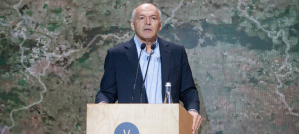YES Turns 20: Two Decades Advancing the European Agenda for Ukraine
On June 25th, the European Union formally opened accession negotiations with Moldova and Ukraine. For all European countries, this signifies a commitment to a stronger EU, ready to devise and enforce joint security policies. For Ukrainians it represents existential progress, bolstered by international and European support in reclaiming their territory, their sovereignty, and freedom from Russian oppression and terror. This achievement is a culmination of the Yalta European Strategy (YES) initiative’s long-standing efforts to support Ukraine’s accession to the EU. However, it also marks the beginning of a journey filled with opportunities and significant challenges.
Two decades fostering dialogue and reflection, making people and nations think, work, plan together, and envision their common future. 20 years to make public opinions and European leaders aware of the urgent need for Ukraine to join the EU in the face of potential threats from its Russian neighbor. 20 years to make it happen, and we did. So let us take a moment to celebrate. To celebrate, not to rejoice though— who could, in the midst of one of the direst conflicts on European soil since the end of World War II?
Let us be proud to have been wise, let us honor the power of reason and the union of Europeans of good will. History has proven us right — for good, as Ukraine is finally reaching its natural destination, being a member of the EU; and for worse: at what cost did Ukraine reach this final achievement ? It took the Russian invasion, it took the toll of Ukrainian lives lost at the forefront of dreadful battles, it took the suffering of the wounded, it took the destructions of homes and the displacement of families. It took the tragedy of History to make our vision be shared and become common knowledge. And the prospect of a European Ukraine does not mean that our organization has fulfilled its mission.
Alongside European integration, YES remains committed to supporting Kyiv with military strategy, international support, and plans for ending hostilities and reconstructing Ukraine. Every year since 2014, conference participants have demonstrated their support with the hopeful slogan, 'Next year in Yalta!' Let's hope they will soon add, '…and also in Brussels.'
There is now a consensus that Ukraine needs further security guarantees. Its leaders and people are considering NATO membership. At YES, we believe the EU has a strong card to play, as our treaty already offers these security guarantees. Ukraine's future as an EU member depends on its efforts and the support of its Western allies. Ending the war favorably requires concerted and sustained support for Kyiv. In this regard, Winston Churchill's words from December 1941 resonate profoundly: 'If we manage it well, it will only take half as long as if we manage it badly.'
Managing the war in Ukraine and securing peace is crucial for a free, democratic, and secure Europe. It remains a key goal of the Yalta European Strategy. More than ever, YES is dedicated to building a future of a free and independent Ukraine in Europe.
Aleksander Kwasniewski
President of Poland (1995–2005), Chairman of the Board of YES
Kersti Kaljulaid
President of Estonia (2016-2021)
Carl Bildt
Minister for Foreign Affairs of Sweden (2006-2014); Prime Minister of Sweden (1991-1994)
Sanna Marin
Prime Minister of Finland (2019–2023)
Stephane Fouks
Vice President of Havas Group, Executive Chairman of H/Advisors, Board member of YES
Wolfgang Ischinger
Ambassador(ret), President, MSC Foundation Council Senior Fellow, Hertie School of Governance, Berlin
Victor Pinchuk
Founder of YES, Founder of EastOne group and Victor Pinchuk Foundation
Anders Fogh Rasmussen
Founder of Rasmussen Global, Secretary General of NATO (2009-2014), and Prime Minister of Denmark (2001-2009).
ABOUT YES
YES started its work in 2004, when Ukrainian businessman and philanthropist Victor Pinchuk invited some 30 European leaders to debate the future of Ukraine and the EU at Yalta. This private initiative evolved into an international organization that engaged Ukrainian, Western and global leaders in discussions, among others with an annual forum in Yalta in Ukrainian Crimea. Yalta, a symbol of Europe’s division in 1945, was turned into a place to discuss a wider Europe, until 2013, when the annexation of Crimea by the Russian Federation, forced the YES Annual Meeting to move to the Ukrainian capital, Kyiv.
←Back to news list

